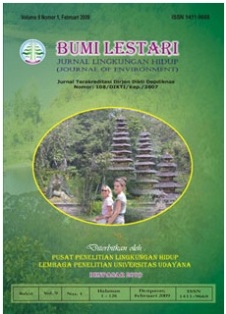TIMBULAN DAN KOMPOSISI SAMPAH DI KAWASAN PERKANTORAN DAN WISMA (Studi Kasus: Werdhapura Village Center, Kota Denpasar, Provinsi Bali)
Abstract
Solid waste is one of the potential problems in Bali Province. One of the waste sources in urban areas especially Denpasar is the office and hotel/inn/guesthouse. Werdhapura Village Center is one of the office and hotel areas in Denpasar. Werdhapura management does not have an integrated waste management. Therefore, it should be made an integrated waste management plan started by doing study about waste generation and composition. The purpose of this study is to investigate the generation and waste composition in Werdhapura and estimate the potential amount of waste that can be managed. The study starts from surveys and interviews regarding the waste sources and existing condition of waste management in Werdhapura. The surveys conducted by reviewing the trash facilities, waste temporary site, and the sources of waste, while the interviews conducted to Werdhapura Management. Waste generation and composition measured by using SNI 19-3964-1995 method. The result showed that waste generation is about 4.6 m/day of volume, and about 302.3 kg/day of weight. Waste composition (%weight) the most is food waste (26.43%), paper (18.55%), residue (14.64%), and organic waste (10.93%). About 47.51% of total waste in Werdhapura was potentially to recycle that is organic waste, food waste, and dry waste.Downloads
Keywords
Authors who publish with this journal agree to the following terms:
- All articles published by Bumi Lestari Journal of Environment and Environmental Reseach Center Udayana University are made available under an open access license worldwide immediately. This means everyone has free and unlimited access to the full-text of all articles published in Bumi Lestari Journal of Environment, and everyone is free to re-use the published material given proper accreditation/citation of the original publication. Open access publication is supported by authors' institutes or research funding agency by payment of a comparatively article processing charge for accepted articles (See Author Fees). Bumi Lestari Journal of Environment and Environmental Reseach Center Udayana University publish articles under the Creative Commons Attribution License.
- Authors are able to enter into separate, additional contractual arrangements for the non-exclusive distribution of the journal's published version of the work (e.g., post it to an institutional repository or publish it in a book), with an acknowledgement of its initial publication in this journal.
- Authors are permitted and encouraged to post their work online (e.g., in institutional repositories or on their website) prior to and during the submission process, as it can lead to productive exchanges, as well as earlier and greater citation of published work (See The Effect of Open Access).





